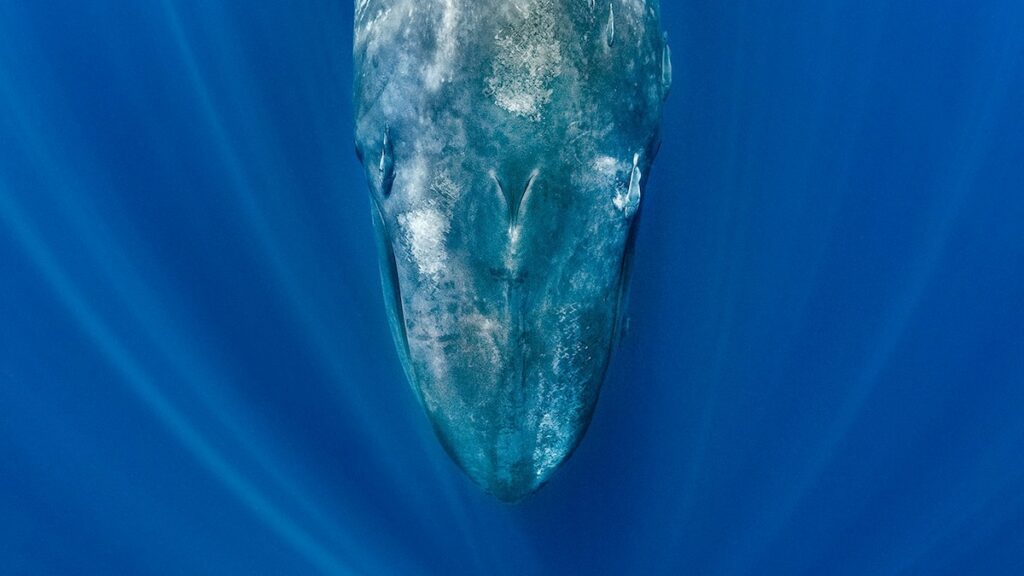“We had been occupied with understanding blue whale ecology,” says Daybreak Barlow, an ecologist on the Marine Mammal Institute at Oregon State College, and lead creator of the research. “And with out making an attempt, we ended up finding out the consequences of marine heatwaves—which, at the moment, is tough to keep away from when working within the ocean.”
Utilizing underwater recorders within the South Taranaki Bight, Barlow and her staff tracked two distinct vocalizations: low-frequency D calls, linked to feeding, and patterned songs, related to mating. Throughout years of abnormally heat water, they discovered fewer D calls in spring and summer season—signaling a drop in foraging effort. Within the following fall, blue whale tune depth additionally declined, suggesting diminished reproductive exercise.
“When there are fewer feeding alternatives, they put much less effort into replica,” Barlow explains.
The absence of calls has grow to be a warning, say scientists.
“Blue whales are sentinels,” says Barlow. “They combine many ocean processes. The place they’re, and what they’re doing can inform you a large number concerning the well being of the ecosystem.”
And the consequences of a single warmth wave can final lengthy after temperatures have cooled.
“The Blob actually highlighted how long-term these penalties could be,” she provides. “This isn’t nearly what occurs in the course of the heatwave—it’s the lasting impacts, particularly for long-lived animals like whales.”
That longevity makes them highly effective sentinels. If a species able to roaming a whole shoreline begins to falter—struggling to seek out meals, delaying replica—researchers say the sign is unmistakable: one thing deep throughout the ecosystem is shifting. And in locations the place warmth waves scorch areas time and again, the transformation could also be irreversible, abandoning a sea that’s profoundly—and maybe completely—modified.
“There’s an opportunity that one in every of these occasions turns into a tipping level, and that will not return to the state we had earlier than,” says Benoit-Fowl. “And that issues. For the way the ocean absorbs carbon, for the fish we eat, and for the way forward for marine ecosystems.”
May listening to whales assist defend the ocean?
Even shallow waters, the place snapping shrimp crackle like underwater firecrackers, are starting to sound totally different. A research printed in 2022 discovered that shrimp, one of many ocean’s most lively noisemakers, snapped extra ceaselessly and with extra pressure as water temperatures elevated. Presumably, the scientists speculate, as a result of they’re agitated.
One problem for utilizing sound to measure ocean-wide adjustments is establishing a baseline for what a pristine ocean appears like. The COVID-19 pandemic supplied a uncommon experiment. When international transport exercise got here to a halt, a quick hush settled over a lot of the planet, together with the seas, earlier than it was catapulted to even sooner manufacturing.
“Actually the animals responded—they modified their distribution and used the habitat otherwise when there weren’t people in these areas anymore,” says Monterey Bay’s Benoit-Fowl.
She remembers the way in which that many witnessed wildlife in empty metropolis streets. Within the ocean, the response was simply as profound, solely tougher to witness. “We don’t have a tendency to consider people as being within the ocean in that very same method,” she provides, “however we’re. We’re there—we’re all over the place.”
Whereas scientists have lately detected sure patterns, extra knowledge is required to attach particular sounds to particular environmental adjustments.
“It’s so laborious to get observations within the ocean,” says NOAA’s Santora. “A community like this opens the door to so many prospects—for conservation, for administration, for mitigation.”


